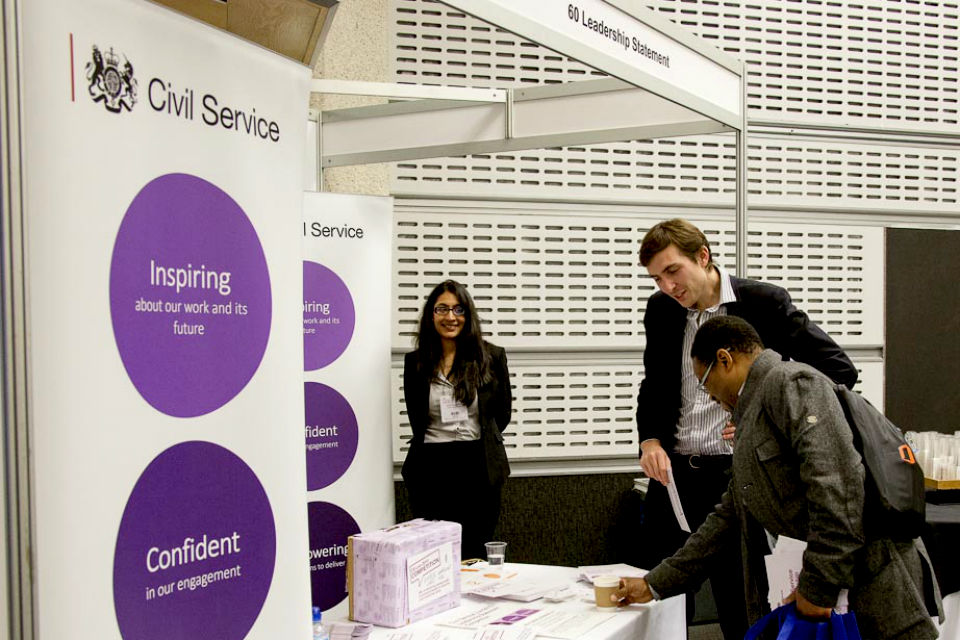
During my career I have had the privilege of working for a number of fantastic, inspirational leaders. Unfortunately, I have also had a small number of less inspirational bosses. So, why is it that some people make you want to throw back the sheets in the morning and scale the heights, and others make you want to curl up and go back to sleep?
Let me describe what I expect from a great leader, and how this fits with the three key behaviours in the Civil Service Leadership Statement.
Inspiring about our work and its future
For me, a great leader is someone who can paint a colourful picture of what the future should look like and why it is important.
They are accessible and visible to those who work in their area, encouraging innovation and sensible risk-taking.
They build human relationships and use them to communicate the importance of their vision, to ensure that adequate resources are in place for the job to be done.

Confident in our engagement
Great leaders are not looking for personal glory. They believe that when things go well there is enough glory for everyone to share.
When things go wrong, rather than looking for scapegoats, they look for the root cause to avoid future failures.
They do not shy away from difficult people issues. They define acceptable behaviours and standards of performance for their team members. People lacking in either of these areas are first coached in how to behave or perform better, but persistent underperformance is dealt with. I have seen this happen effectively in many settings, and it is nearly always welcomed by everyone else on the team.
I have always found that great leaders have zero tolerance of bullying, harassment and ‘attitude’, and value, encourage and reward teamwork. Nothing is more corrosive than infighting in or between teams.
They build and maintain relationships with all their key stakeholders, and encourage and help their team members to do likewise.
Empowering our teams to deliver
Empowering leaders involve people (not just their immediate circle but the wider team) in creating the vision and the roadmap of how to get there.
They set challenging targets, which initially can seem daunting, but they coach and develop the team to achieve more than they thought they could.
The best leaders work without ego. They are humble, and do not think that they know all the answers themselves. They listen to the ideas and views of others.
Great leaders establish two-way communication. They are not only interested in good news, but welcome early warning of potential problems.
They actively listen to their stakeholders’ needs, wants and concerns so that these can be effectively managed. They do not have a knee-jerk reaction every time they hear a different view from a more senior person but are prepared to challenge.
It can be done
All of the above may sound a lot to ask of one person. But I have worked with people who had all of the attributes outlined above, and more who had most of them. I have only worked for one boss who had none (not a happy time).
One of my favourite bosses – a truly inspirational leader, with a team who always over-performed – said that when he got up in the morning he did not think “what am I going to do today”, but “what am I going to be”. He might decide that he needed to be inspiring in rallying the troops, or to be forceful in arguing his case in a budget meeting. He found this a much more useful way to channel his energies than just having a list of tasks.
Great followers
A final word on leadership.
It’s easy to think that the only leader that matters is the one at the top of an organisation, and indeed they do cast a far-reaching shadow. However, I believe we can all be leaders in our own way, regardless of where we are in the organisation. We all have the ability to inspire others. Great leaders tend to have great followers, so everyone has a role to play in building great leadership.
I’m interested to hear if you’ve been able to learn from one of your favourite leaders. Have you changed your behaviour to match their good example?

4 comments
Comment by Jackie posted on
Interesting article - and very true. I was taught leadership is about the person and management is about the process. I had an inspiring manager as he was an amazing people person and managed to adapt his style to each different person and to different siutuations - it wasn't a case of one style being used to fit all. He may have been in charge but he listened to and valued your opinion. He constantnly gave feedback and actively encouraged that to be two-way - so if there were any issues they were resolved early. He also gave praise when a good job was done and thanked his staff for their efforts at the end of a hard or difficult shift. He also gave his staff the ability to become empowered by the decisions they made in work. He certainly knew how to get the best out of his staff and is extremely well respected.
Comment by Ash posted on
Very true
Comment by Kandi posted on
All good sentiments here. However why does everyone need an inspirational leader to get up and go in the morning. Be your own inspiration and lead ourselves to great things.
Comment by Richthofen posted on
Good point.